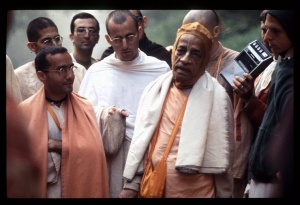CC Madhya 17.60 (1975)

A.C. Bhaktivedanta Swami Prabhupada
TEXT 60
- yāhāṅ vipra nāhi tāhāṅ 'śūdra-mahājana'
- āsi' sabe bhaṭṭācārye kare nimantraṇa
SYNONYMS
yāhāṅ—wherever; vipra—brāhmaṇa; nāhi—there is not; tāhāṅ—there; śūdra-mahā-jana—devotees born in families other than brāhmaṇa; āsi'-coming; sabe—all of them; bhaṭṭācārye—to Balabhadra Bhaṭṭācārya; kare nimantraṇa—make invitation.
TRANSLATION
In some villages there were no brāhmaṇas; nonetheless, devotees born in non-brāhmaṇa families came and extended invitations to Balabhadra Bhaṭṭācārya.
PURPORT
Actually a sannyāsī or a brāhmaṇa will not accept an invitation extended by a person born in a lower family. However, there are many devotees who are raised to the platform of brāhmaṇa by their initiation. These people are called śūdra-mahājana. This indicates that one who is born in a non-brāhmaṇa family has accepted the brāhmaṇa status by initiation. Such devotees extended invitations to Balabhadra Bhaṭṭācārya. A Māyāvādī sannyāsī will accept an invitation only from a brāhmaṇa family, but a Vaiṣṇava does not accept an invitation from a brāhmaṇa if he does not belong to the Vaiṣṇava sect. However, a Vaiṣṇava will accept an invitation from a brāhmaṇa or śūdra-mahājana if that person is an initiated Vaiṣṇava. Śrī Caitanya Mahāprabhu Himself accepted invitations from śūdra-mahājanas, and this confirms the fact that anyone initiated by a Vaiṣṇava mantra can be accepted as a brāhmaṇa. One can accept an invitation from such a person.